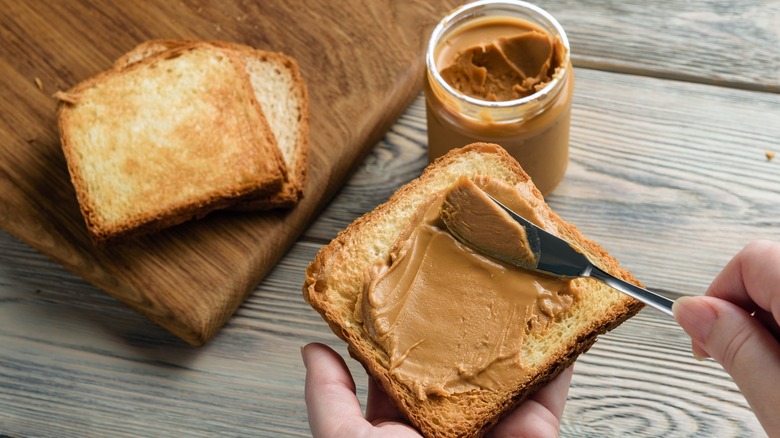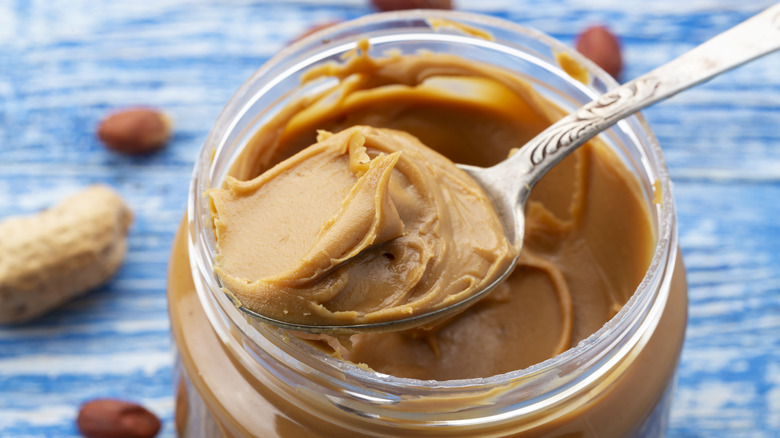Peanut Butter Has An Unexpected Effect On Your Immune System
The idea of maintaining a healthy immune system often drifts into your mind when you're in bed, sick with the flu. A well-functioning immune system is your body's first and often best defense against the various harmful bacteria, viruses, and parasites that can make you sick.
Being physically active, maintaining a healthy weight, giving up habits like smoking or consuming too much alcohol, and sleeping for your recommended hours every night all play important roles when it comes to strengthening your immunity. In fact, even a poor marriage can have an unexpected effect on your body, including your immune system. (Time to take a look at the quality of your relationships, perhaps?)
Diet is a big part of it too. However, most of us won't associate peanut butter with immune-system-boosting foods. When you think about being able to fight off colds, flus, and other more serious diseases, you'd probably think of leafy greens, citrus fruits, berries, fish oil, and spices like garlic and ginger. And while there's nothing wrong with any of those foods, peanut butter can help in this area, too. The popular breakfast nut butter spread is a rich source of antioxidants and other nutrients that help you ward off diseases like heart disease and type 2 diabetes. These nutrients also help boost your immune system.
What are the immune system-boosting nutrients in peanut butter?
Peanut butter is a great source of copper, one of the many nutrients involved in immune system function. Getting sufficient amounts of copper could combat the risk of heart disease and osteoporosis. In addition to maintaining your immune system, copper is essential for making red blood cells and nerve cell function.
Peanuts are also a good source of vitamin E and zinc, two more nutrients that benefit your immune system. According to a 2019 study published in the journal IUBMB Life, vitamin E helps prevent cell membrane damage. Zinc is essential for metabolic and immune system function, while also promoting wound healing.
Additionally, peanut butter is a rich source of omega-3 fatty acids, a type of healthy fat that is associated with reducing inflammation in your system. Other nutrients in peanut butter that support the healthy functioning of your immune cells include iron and protein. In fact, peanut butter has all the nutritional benefits of this popular animal protein, which is probably why those who work out a lot love to consume peanut butter as a pre- or post-exercise snack. In addition to all of these nutrients, peanut butter contains a good amount of fiber, manganese, vitamin B3, and potassium.
How to consume peanut butter for immune system health
For some people, consuming peanut butter can result in an unpleasant immune system response that produces symptoms like hives and redness on your skin, itching and tingling in your mouth and throat, tightening of your throat, diarrhea, stomach pain, nausea, or vomiting, difficulty breathing, wheezing, runny nose, and sometimes even life-threatening anaphylaxis. Peanut allergies are one of the most common among children, but they can also affect adults. In fact, according to a 2021 study in the Journal of Allergy and Clinical Immunology, 4.6 million U.S. adults have a peanut allergy, and 800,000 of them developed it after they turned 18.
That being said, peanut butter is a convenient, relatively inexpensive, and yummy treat to include in your breakfast foods, desserts, and other recipes. The healthy fats, fiber, and protein keep you feeling full for longer (so it's great for people who are trying to maintain a healthy weight), it's good for bone, skin, and hair health, and it also promotes gut health. However, not all peanut butter jars are the same. Shopping for nut butter might involve scoping out the healthiest brands of peanut butter you can eat and avoiding added ingredients like sugars, excess sodium, and unhealthy fats. Look for a small ingredient list, ideally just peanuts and some salt. Also, be mindful that eating too much peanut butter can have unexpected (and unsavory) effects on your health too. It is considered a high-calorie food and contains saturated fat.



